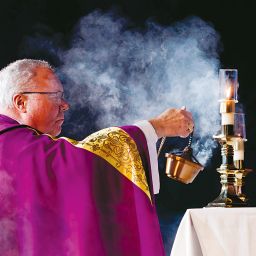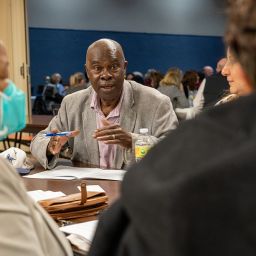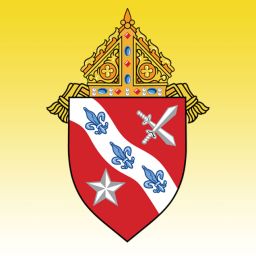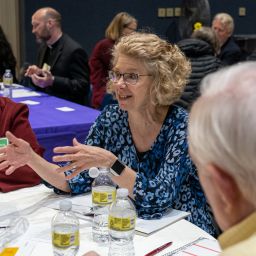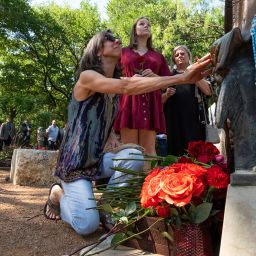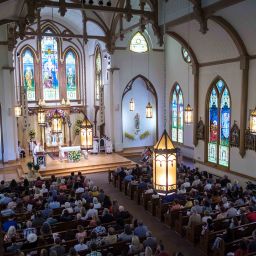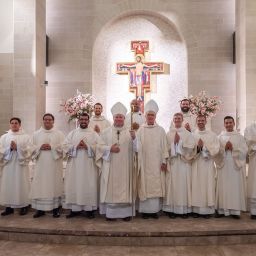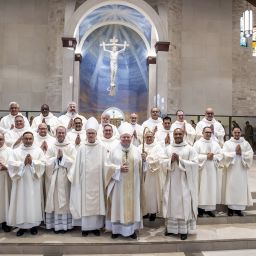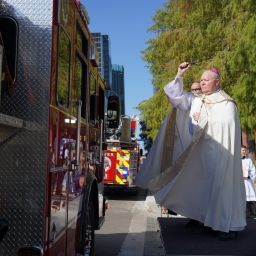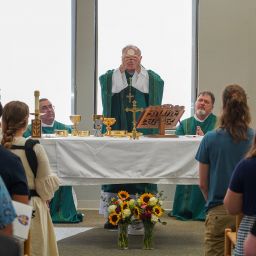By Michael Gresham
The Texas Catholic
IRVING — A historic moment for the Diocese of Dallas now turns its focus to the future of the Church in the diocese.
From Dec. 1-4, the Diocese of Dallas convened its first synod assembly in 90 years, marking a pivotal moment in the diocese’s 10-year journey of reflection and renewal. Over four days, 284 delegates from across the diocese’s nine counties gathered at the Dallas-Fort Worth Marriott hotel in Irving to pray, listen, and discuss the challenges and needs facing the Diocese of Dallas.
“We are co-workers in the vineyard,” said Bishop Edward J. Burns. “St. Paul reminds us that we are called in different ways, but together, we build up the body of Christ. Therein lies the joy that we’re going to see in this diocese by working together and binding ourselves as one body of Christ.”
In releasing his pastoral letter, “The Journey Through Lent, Easter, Ascension, and Pentecost: Diocesan Synod and Post-Pandemic Pastoral Plan for the Diocese of Dallas,” on Ash Wednesday 2021 as a response to the COVID-19 pandemic, Bishop Burns called for only the third synod in the history of the diocese, noting he felt the Church needed a historic response to a historic pandemic. The prior two synods had been called by Bishop Joseph P. Lynch in 1911 and 1934.
“I saw a need for a diocesan synod during the historic pandemic when our pews were empty, our pulpits silent, and our altars were barren. I knew we needed to do something historic to compensate for this pandemic,” Bishop Burns said. “The fruits of the synod, I believe, will help re-envision the sense of proclaiming the Gospel message and bringing forth the mission of Jesus Christ here in north Texas and in our Diocese of Dallas.”
The synod, launched on Dec. 12, 2021, the feast of Our Lady of Guadalupe, engaged more than 9,000 people in 30 listening sessions over two years. Their voices produced more than 4,000 pages of insights that were distilled by a 27-member preparatory commission into 1,356 resolution ideas. Lacy de la Garza, executive director of the synod, worked with Diocese of Dallas Chancellor Gregory Caridi to refine those ideas into 376 actionable resolutions.
During the synod assembly, delegates discussed and offered a consultative vote on resolutions presented to Bishop Burns for consideration. These resolutions addressed a wide range of challenges, including the need to support priests, strengthen families, and enhance evangelization efforts throughout the diocese.
“The conversations here have been rich and Gospel-centered,” Bishop Burns said. “We anticipate a future filled with hope, where God blesses our endeavors and strengthens the Church as a beacon of Christ’s light in the world.”
Deeply moving dialogues
De la Garza expressed “profound gratitude, joy, and awe” at the level of engagement, discourse, and faith displayed by delegates during the four-day assembly.
“The delegates who have shared comments during this process have moved me very deeply,” de la Garza said. “It affects my heart to hear the sincerity with which they’re bringing their comments to the bishop and to each other to be considered. They’ve had time to think and pray with their remarks before coming here to share them out loud. I want to treasure and value that time that the Lord has been with them through this process of preparation, so that we can all benefit from the fruits of their prayer with Him.”
De la Garza said the assembly was highlighted by the heartfelt discussions and honest reflections, which many described as evidence of the Holy Spirit at work.The Holy Spirit is here in this room,” she said. “There’s no other way to describe it but as palpable. We all feel the Lord with us, specifically through the powers of the Holy Spirit. It’s evident in our ability to sit in community through very difficult conversations, listening openly and freely to what the Lord is asking us to hear. I can’t describe it any other way than the miraculous.”
The synod assembly, de la Garza noted, brought together representation from every corner of the diocese, embodying a spirit of unity and shared apostolic mission.
“Every aspect of our diocese was represented in some way,” de la Garza said, stressing that all members of the diocese were represented through the assembly whether they were a delegate or not. “Even for those not physically present, their voices and comments, experiences with the Lord, and faithful spirit were part of this process. We were all in that room, and the fruits of this assembly will be untold from that kind of representation.”
Likewise, Bishop Burns praised the spirit of dialogue and fellowship displayed by delegates while they discussed resolutions, noting the unique atmosphere of respect and faithfulness that permeated the gathering, even touching those outside the Catholic faith.
“I was so touched when one of the sound crew, who isn’t Catholic, remarked that they’d never seen a dialogue with this level of respect and openness,” the bishop said. “That speaks to the beauty of this assembly and the people here.”
A future of hope
As the assembly got underway, Bishop Burns asked delegates throughout the process to consider how they envisioned the future of the Diocese of Dallas.
“I wanted the delegates to place themselves in the year 2031, and looking back, what would they like to see different than what they see today,” Bishop Burns said. “It’s a future full of hope. It’s a future filled with the anticipation of God blessing our endeavors and giving success to the work of our hands to see all of this come to fruition.”
Looking ahead, de la Garza emphasized the importance of collaboration among all members of the Church in the Diocese of Dallas.
“The role of the laity, clergy, and religious in bringing the fruits of the synod to fruition will be intertwined,” she explained. “There’s no other way for us to do the acts of God that He’s asking us to do except by working together. We each have distinct roles, but our work is interconnected. Defining those roles while fostering communication and vision will be vital as we move forward.”
What’s next?
The synod assembly represented the culmination of years of preparation and prayer, but it is not the end of the diocese’s synodal journey. When Bishop Burns called for the synod in 2021, he called for it to conclude Dec. 12, 2031, with a Mass to celebrate the 500th anniversary of Our Lady of Guadalupe’s appearance to San Juan Diego.
“This is a 10-year process of introspection and renewal,” de la Garza explained. “Now, we move toward implementation where Bishop Burns, and his implementation commission, will work in consultation with the priests of the diocese to discern how to carry forward the priorities and recommendations of this assembly. It’s really going to be a time for fruitfulness and discernment as we work to address the needs of our diocese.”
According to de la Garza, members of the implementation commission have been identified and are in the process of being contacted. The implementation commission will begin meeting in January 2025. In the meantime, Bishop Burns will discern the resolutions that have been forwarded to him by assembly delegates for consideration. In addition to voting on resolutions, delegates also voted on prioritization of those resolutions.
“The work of the synod is not complete,” Bishop Burns said in a message posted to the diocesan website on Dec. 6. “This gathering showed me the heartfelt desires of the faithful — with their hopes and determination to build a stronger, holier, and mission-driven diocese that will continue to fulfill Christ’s words: ‘You are Peter, and upon this rock, I will build my Church.’”
Cutline for featured image: At the conclusion of the closing Mass for the Diocese of Dallas Synod Assembly, Bishop Edward J. Burns joins delegates, staff, and volunteers in applause as Lacy de la Garza accepts a bouquet of roses in appreciation of her efforts as the executive director of the synod. Two hundred and eighty-four delegates from around the diocese gathered Dec. 1-4 at the Dallas-Fort Worth Marriott hotel in Irving to offer a consultative vote on 376 synodal resolutions presented to Bishop Burns for consideration. (Michael Gresham/The Texas Catholic)

